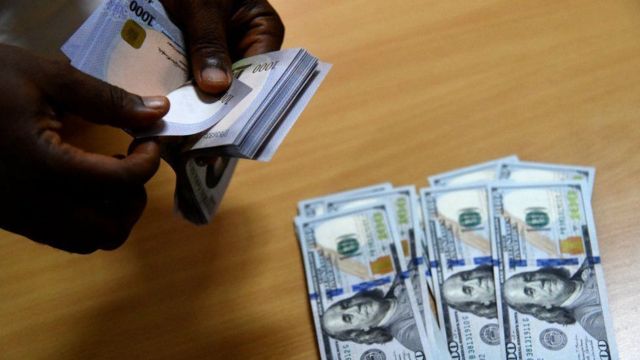Share!
The exchange rate in the Investors and Exporters, I&E window increased to N664.04 per dollar from N471.67 per dollar on Tuesday, which caused the Naira to lose over half of its value in the official market yesterday.
This comes after the Central Bank of Nigeria on Wednesday announced market-liberalizing measures, such as the abolition of multiple exchange rates and the flexibility for banks to trade foreign exchange at any rate based on a willing buyer and willing seller arrangement.
Announcing the new measures in a statement titled, “Operational Changes to the Foreign Exchange Market”, Director, Financial Markets, Dr. Angela Sere-Ejembi, said: “The Central Bank of Nigeria (CBN) wishes to inform all authorized dealers and the general public of the following immediate changes to operations in the Nigerian Foreign Exchange (FX) Market:
“Abolishment of segmentation. All segments are now collapsed into the Investors and Exporters (I&E) window. Applications for medicals, school fees, BTA/PTA, and SMEs would continue to be processed through deposit money banks.
“Re-introduction of the “Willing Buyer, Willing Seller” model at the I&E Window. Operations in this window shall be guided by the extant circular on the establishment of the window, dated 21 April 2017 and referenced FMD/DIR/CIR/GEN/08/007. All eligible transactions are permitted to access foreign exchange at this window.
“But at the same time all those who used to buy a mix of parallel market and official rate to get a blend, now that means there is no official rate at around N470/$, everybody will now have to buy at a higher rate, which might lead to higher prices of goods.”
In his reaction, Dr Muda Yusuf, Chief Executive Officer, the Centre for the Promotion of Private Enterprise (CPPE), said that the liberalization of the foreign exchange (forex) market would unlock huge potential for investment and boost government revenue by N4 trillion through additional remittance of exchange rate surplus to the federation account by CBN.
His words: “The liberalization of the foreign exchange (forex) market would unlock the huge potentials for investment, jobs and capital flows. Investors’ confidence would be positively impacted.
“Meanwhile, it should be clarified that this is not a devaluation policy, but a pricing mechanism that reflects the demand and supply fundamentals in the forex market.
“It is a framework which allows for flexible rate adjustments as and when necessary. It is a model that is predictable, equitable, transparent and sustainable. It is a policy regime that would reduce uncertainty and inspire the confidence of investors. It would minimize discretion and arbitrage in the forex allocation mechanism.
“Rate unification does not imply that rates will be exactly the same in all segments of the market. The objective is to ensure that the differentials are very minimal, possibly between 5-10%.
“A unified exchange rate regime offers the following benefits for the economy: It enhances liquidity in the forex market; reduces uncertainty in the market and therefore enhances the confidence of investors; more transparent as a mechanism for forex allocation; minimizes discretion in the allocation of forex and reduces corruption vulnerabilities; and reduces opportunities for round tripping and other sharp practices.
Other benefits, he listed, are: “It would increase disclosures with respect to export proceeds and compliance with non-oil export declarations, especially the non-oil export documentation; boost government revenue by a minimum of N4 trillion through additional remittance of exchange rate surplus to the federation account by CBN; use of naira cards for limited international transactions would be restored in the short to medium term; would facilitate the mopping up of naira liquidity in the economy in the short to medium term. This would impact positively on inflation outlook; and deepen the autonomous forex market through the liberalization of inflows from Export Proceeds, Diaspora Remittances, Multinational oil companies, diplomatic missions etc.
“In the short term, we expect a
Nigeria’s sovereign credit rating should improve if this is complemented with the right fiscal and monetary policies thereby attracting more FX inflows and lowering the cost of borrowing”.
Also sounding a note of caution, Prof Uche Uwaleke, President, Association of Capital Market Academics of Nigeria, ACMAN, said: “Let me say upfront that I support the unification of exchange rates which makes for a more transparent forex market.
“But I think that the CBN should implement that in a way that does not cause massive distortions in the general price level. In this regard, a sudden free float of the naira is not advised given that the economic fundamentals required to support a naira float are still very weak especially in relation to sources of forex.
It’s rather early to bank on sustainable capital inflows from foreign direct investments due in part to insecurity and the overall unconducive environment of doing business in Nigeria. This sudden naira devaluation may draw foreign portfolio investments which is part of the reason the stock market is surging. But we also know that portfolio investments are hot money and do not represent a sustainable source of forex inflows.
“In consideration of this therefore, I would advise that the unification of exchange rates should not be a one step process but should be implemented over a period of time however short it may be.”
Speaking on the development, Managing Director/CEO of Leadway Pensure PFA, Mr. Lanre Idris stated: “The FX market is now free to trade on a willing seller and buyer basis without a capped price.
“The value of the naira will be determined on a demand and supply level and allowed to be able to find its true value. The free float is expected to attract future inflows on FPI flows as investors can inflow and repatriate the funds at a rate determined by the market.
“We expect more clarity by the time the official notice is released to the market.”
